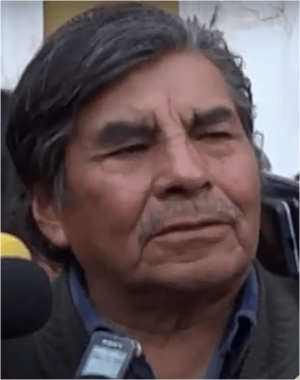Felipe Quispe facts for kids
Quick facts for kids
Felipe Quispe
|
|
|---|---|
 |
|
| Member of the Chamber of Deputies from La Paz |
|
| In office 6 August 2002 – 1 June 2004 |
|
| Personal details | |
| Born |
Felipe Quispe Huanca
22 August 1942 Achacachi, La Paz, Bolivia |
| Died | 19 January 2021 (aged 78) El Alto, La Paz, Bolivia |
| Political party | Jallalla La Paz (2021) Pachakuti Indigenous Movement (2002–2005) |
| Education | Higher University of San Andrés |
Felipe Quispe Huanca (born August 22, 1942 – died January 19, 2021) was an important Bolivian historian and political leader. People often called him "Mallku", which means "condor" in the Quechua language. It also means "peak" or "leader".
He led a group called the Pachakuti Indigenous Movement (MIP). He was also the general secretary of a big union for farmers in Bolivia, the United Union Confederation of Working Peasants of Bolivia (CSUTCB).
Life and Work
Felipe Quispe was born in Achacachi, Bolivia. He spent his life working for the rights and recognition of indigenous people, especially the Aymara people.
Early Activism
In 1979, Quispe helped start the Indian Movement Túpac Katari. This group worked to improve the lives of indigenous people in Bolivia. Later, in 1990, he also helped create the Tupak Katari Guerrilla Army. These groups aimed to bring about change and protect the rights of indigenous communities.
The name "Mallku" is special. It refers to the spirit of the mountains that protect the people. It is also a title for a respected leader.
Political Ideas and Goals
Quispe believed strongly in the rights of indigenous people. He wanted to create a new republic called "Collasuyu" in areas where the Aymara people lived. This new republic would be based on the ancient Tawantinsuyu empire.
He was against certain economic policies that he felt hurt his community. He also strongly opposed efforts to stop the growth of coca plants. For the Aymara people, coca is a very important part of their culture and traditions.
Quispe was also involved in the Bolivian Gas War. This was a time of big protests in Bolivia about how the country's natural gas resources should be used.
Later Political Career
In 2005, Quispe ran for president of Bolivia. He did not win, and another indigenous leader, Evo Morales, became president.
Even though Morales was also indigenous, Quispe often criticized his government. He felt that Morales's policies were too similar to the economic ideas he disagreed with.
Felipe Quispe passed away on January 19, 2021, in El Alto, Bolivia, due to a heart attack.
See also
 In Spanish: Felipe Quispe para niños
In Spanish: Felipe Quispe para niños

